Nearly a week into UC strike, little bargaining progress, but support for workers grows
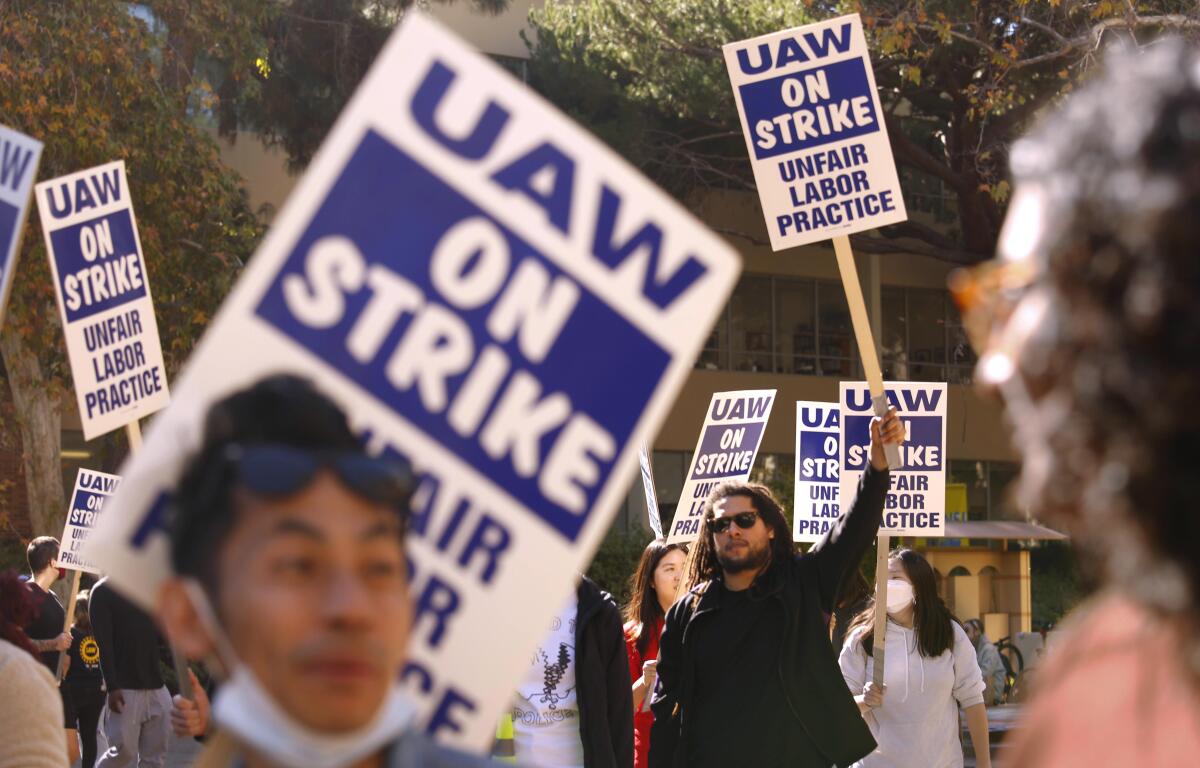
- Share via
Menelik Tafari, a fourth-year urban schooling graduate student at UCLA, walked off the job Monday with about 48,000 other University of California academic workers to strike for better pay and benefits. Since his daughter was born in May with complications, he said, he and his wife have struggled to pay for the child care she needs.
Tafari, 32, is one of the organizers behind what has been billed as the largest work stoppage at any academic institution. And as the strike entered its fourth day Thursday, halting research and prompting widespread class cancellations across the UC system’s 10 campuses, the workers said their action has brought to light their financial hardships and difficult working conditions.
“Because my daughter was born with complications, we’ve been on seizure watch,” Tafari said. “We have been very lucky because my mother-in-law has been taking over as the primary caregiver. We pay her around $1,500 a month, depending on what’s going on. But if we didn’t have a family member who was willing and able, we’d be paying about $2,500 a month.”
Tafari earns about $2,500 a month as a teaching assistant and said he has taken other jobs to supplement the income and cover the costs of raising his daughter. In negotiations, the university has proposed covering $2,500 a year in child-care costs for postdoctoral scholars, but Tafari said that isn’t enough.
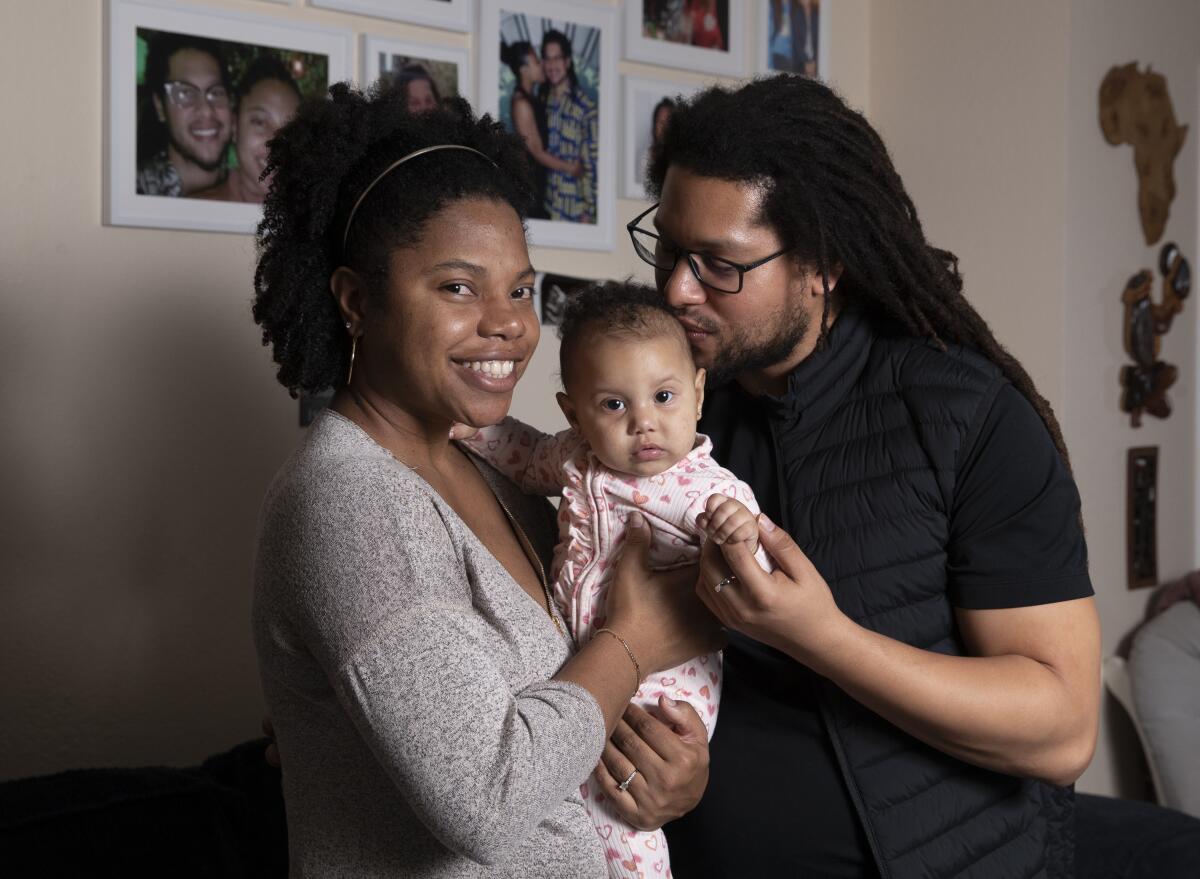
On Thursday, the union representing academic workers said the two sides had made progress on issues of parking and transit, job security provisions and paid time off. But on compensation, a major sticking point, the UC’s slight increase fell short of union demands.
The union said the new offer amounted to raises of about $132 a month for most student researchers, which would leave many workers paying 56% of their income on rent. The proposal also failed to include in the contract any supplemental compensation, which many graduate workers would receive in addition to base salaries.
“We still think this is far from sufficient,” said Rafael Jaime, president of United Auto Workers Local 2865, which represents 19,000 of the striking workers.
Ryan King, a spokesperson for UC, pointed out that the university’s latest proposal eliminates the two lowest salary steps for graduate researchers, which would amount to significant increases for those workers, closer to 20%, calling it a “generous proposal.” But he did say the average increase would be around 8% for most graduate student researchers.
On Wednesday, UC Provost Michael Brown told university leaders in a letter that the union’s pay and housing demands would be an “overwhelming” financial hit that could reach several hundred million dollars a year.
Pushing back, the union said the four UAW bargaining units representing striking workers are asking for a package that would amount to 4.5% of UC’s total budget.
“That’s a fair price to pay for world-class teaching and research,” the union said in an email.
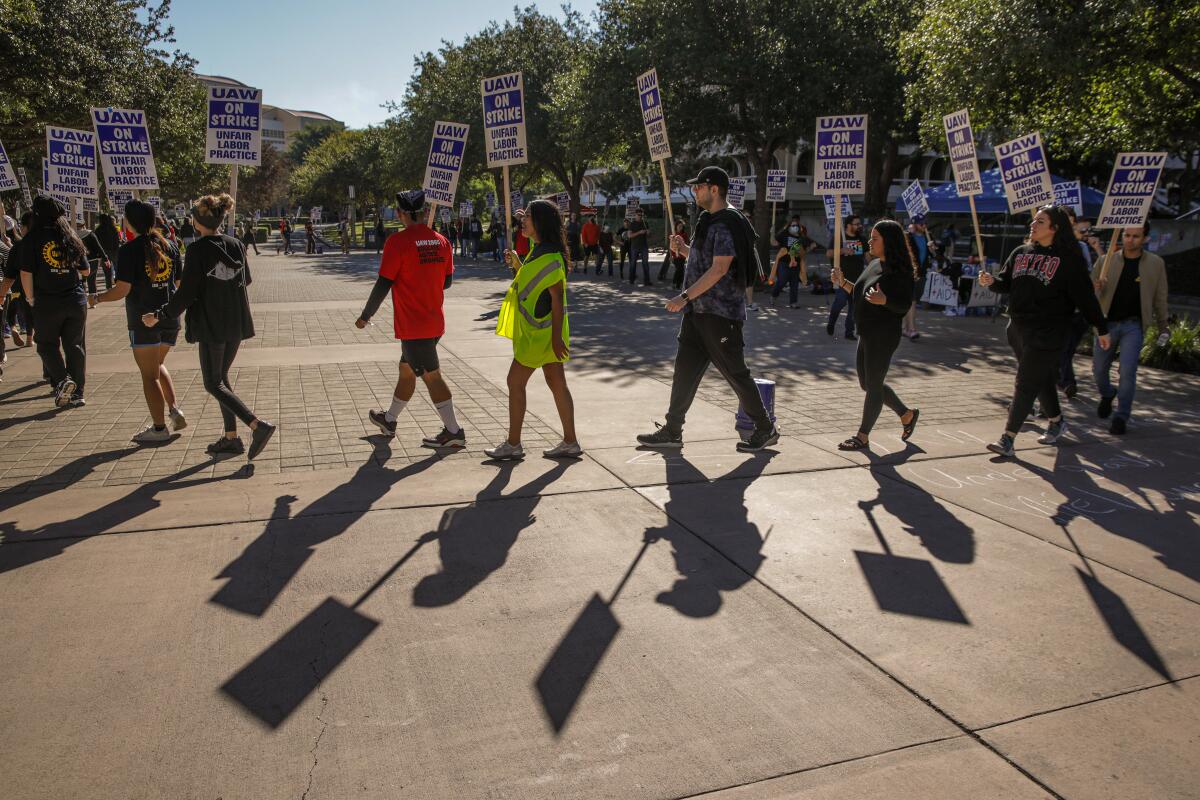
Though UC officials called for a third-party mediator Monday, Jaime said he was glad the university has continued to bargain without one.
Jaime accused UC of dragging its feet, saying the university bargained Wednesday and Thursday with only one of the four striking units: that representing graduate student researchers.
“It’s very inefficient,” Jaime said. “We want to be bargaining around the clock.”
Meanwhile, as polls show U.S. support for labor unions at its highest point in nearly 60 years amid a wave of high-profile campaigns at companies such as Starbucks and Amazon, backing for the UC strike has grown among some students, faculty and workers at other unions.
Faculty members said they’ve held “teach-ins” about the strike or brought their classes down to the picket line, and some professors have canceled classes altogether.
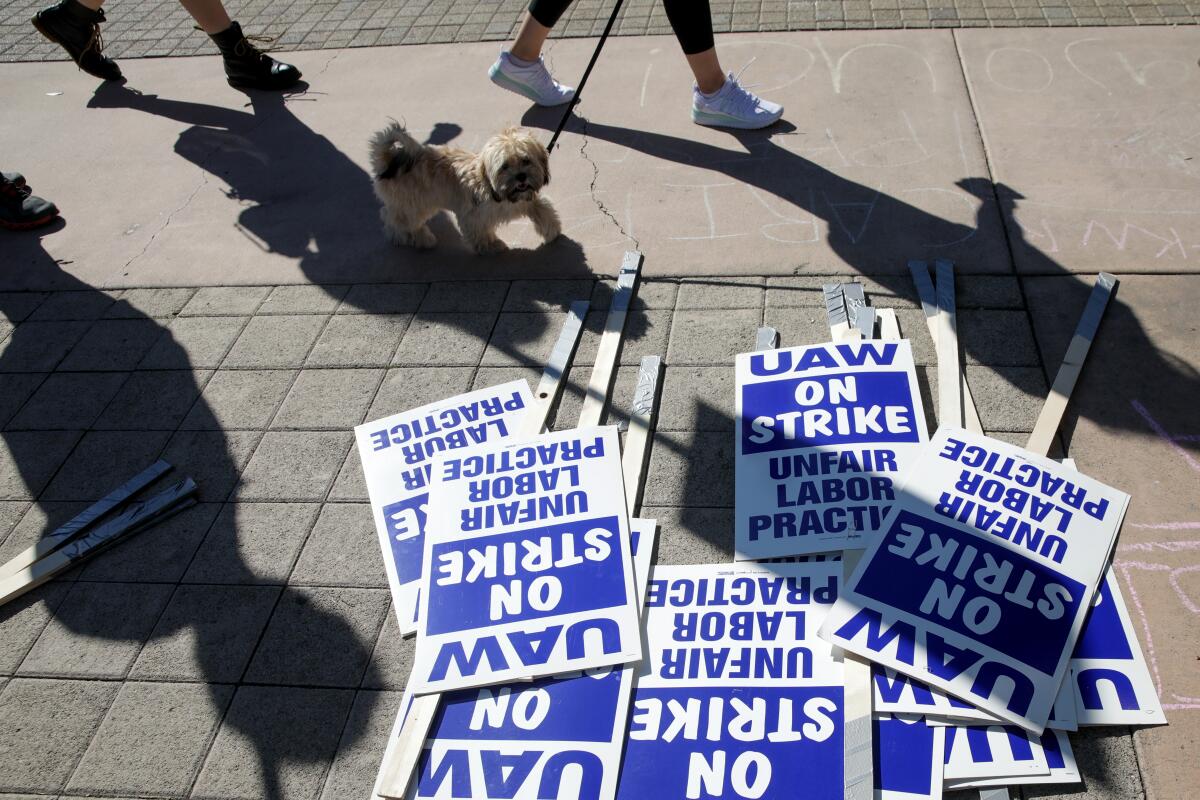
Though lecturers in the UC system have a clause in their contract against canceling their classes in “sympathy strikes,” Katie Rodger, president of the UC-AFT, said the union that represents about 6,000 UC lecturers and librarians is encouraging members to support striking workers by joining the picket lines when not carrying out assigned duties.
Undergraduate support for the strikers has surpassed 16,000 signatures, and the union has received almost 50 letters of support from faculty and departments across the 10 campuses.
Among those departments is the ethnic studies department at UC San Diego, where assistant professor Roy Pérez, said he teaches both undergraduate and graduate classes, including one with more than 400 students that usually has seven teaching assistants.
“UCSD could not meet the educational needs of so many students without the work of TAs,” Pérez said. “TAs’ working conditions should be a top financial investment if the UC system wants to sustain the quality of education it promises while pursuing record-breaking enrollment numbers.”
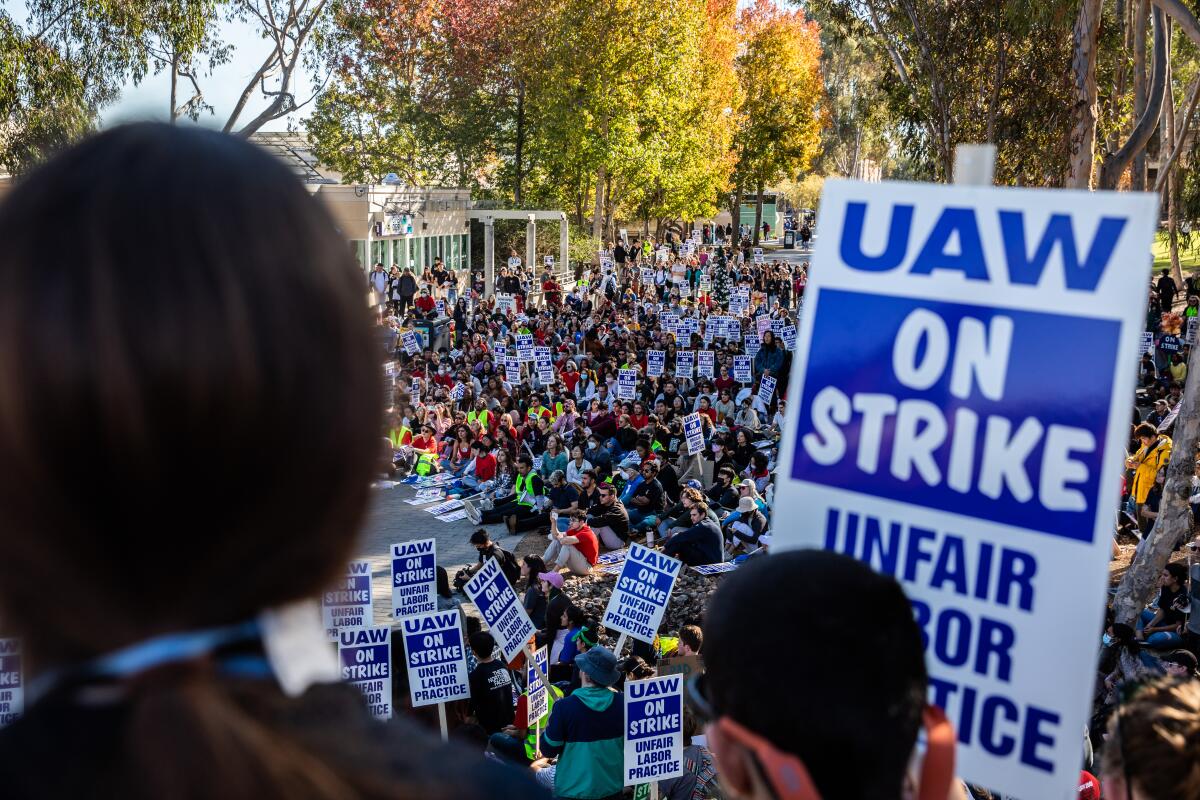
Nick Callen, a fourth-year undergrad at UC San Diego, said two of his classes have been indefinitely canceled as the strike continues. One of his professors has gone on with business as usual, not mentioning the strike or changing classes.
“I am a little concerned just because it’s close to the end of the quarter,” Callen said of his disrupted classes. “It’s like we’re on hold until we hear something back from the strike. … It is really stressful, but I’m glad that they’re doing it.”
Amina Hearns, a fourth-year UC Riverside student, tutor represented by the UAW and the chair of the UC Student Assn., said there’s a divide between undergraduates in humanities, arts and social sciences who support the strike and students in math and science who tend to be less supportive. She said the divide can be attributed to misinformation from the administration and some of their professors.
“They try forcing this grad students versus undergraduate students,” she said. “Like ‘Look, they’re not striking and not grading your work and that’s why you’re behind.’ And that’s not true at all. The fact that they’re not reading your work is because they’re not getting the demands that they need.”
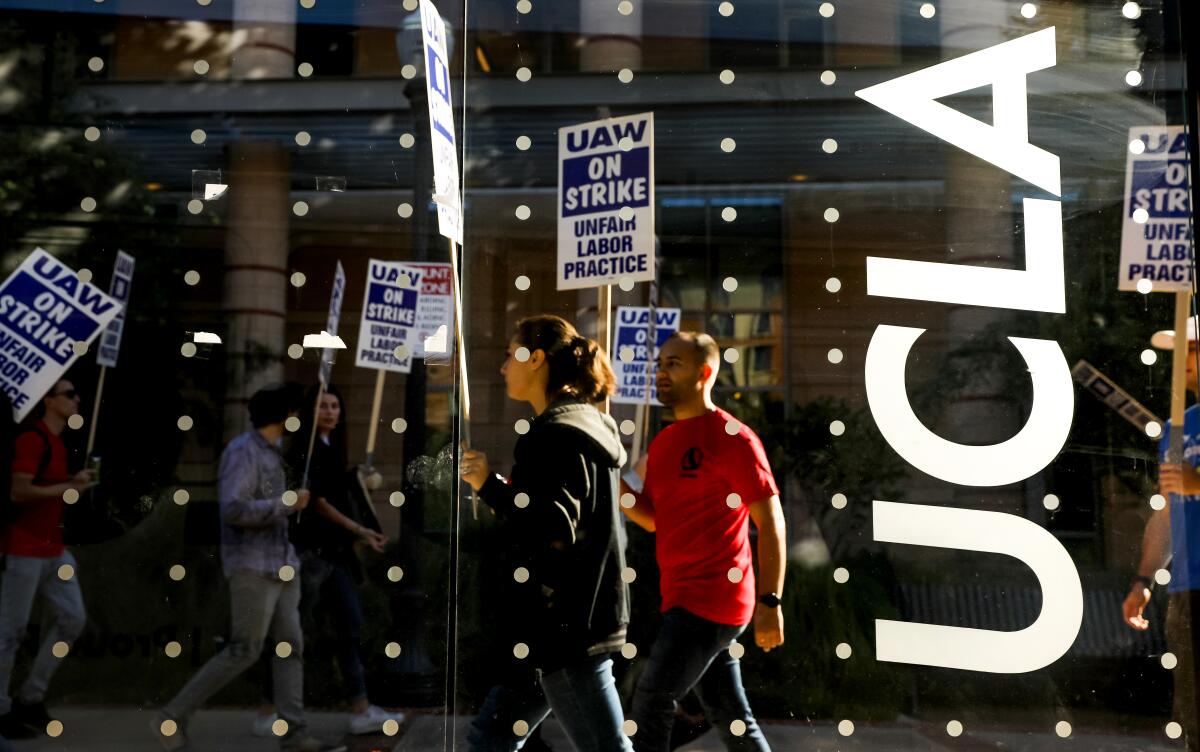
Teamsters, the union representing drivers and other workers, notified UPS drivers in southern and northern California that they have the right to honor the picket line and not deliver packages to campuses during the strike.
At UC Berkeley, strikers spoke Wednesday morning with workers from the International Union of Operating Engineers, the International Brotherhood of Electrical Workers and the Laborers’ International Union of North America. The union members agreed not to work at the construction site in solidarity with the strike.
The workers are demanding a base salary of $54,000 for all graduate student workers, child-care subsidies, enhanced healthcare for dependents, longer family leave, public transit passes and lower tuition costs for international scholars. The union said the workers earn an average current pay of about $24,000 a year.
UC has offered salary scale increases of 7% in the first year and 3% in each subsequent year for teaching assistants and tutors, and increases for postdoctoral scholars of 8% the first year, 5% the second year and 3% in subsequent years. UC said pay increases would amount to up to 17%, depending on the union.
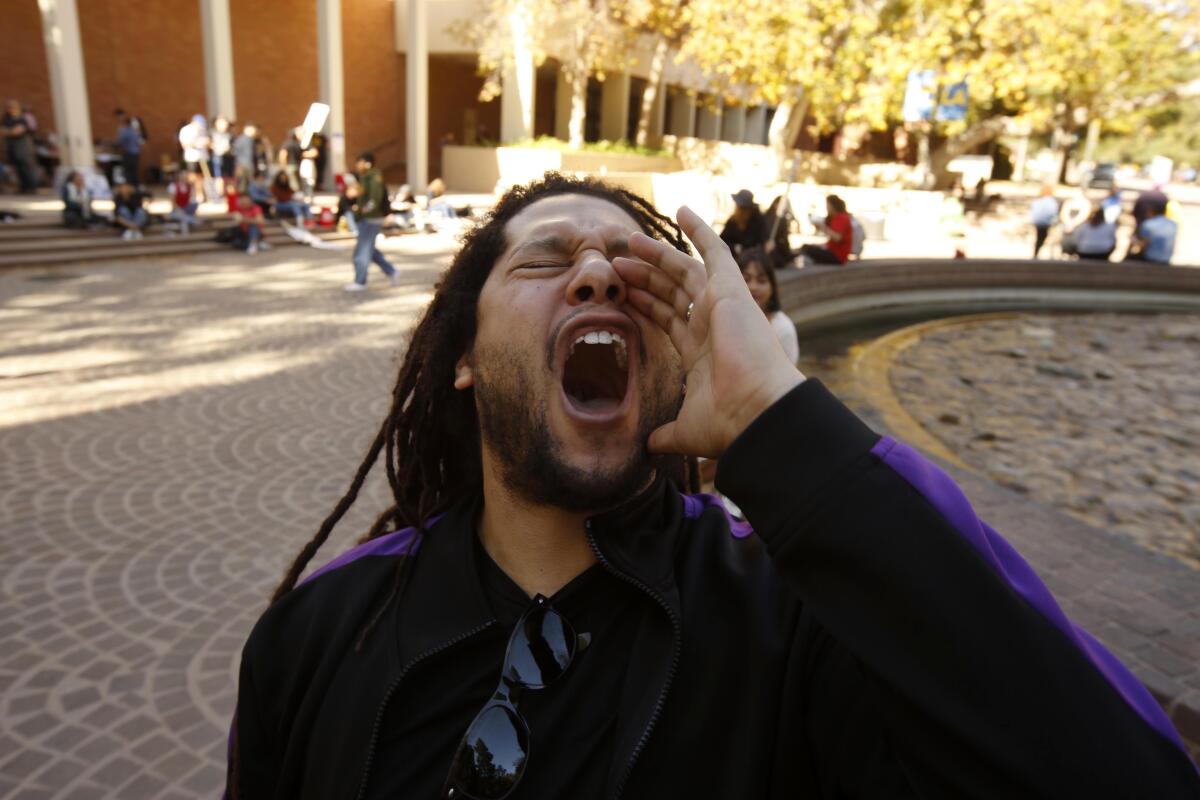
Between his four-year fellowship and a guaranteed job doing medical education research for the school, Tafari is able to cover the tuition and fees for his program, but because his fellowship is over in June, he said he’ll have to pay about $40,000 a year to finish his degree.
“If you’re undocumented, if you’re poor and an international student, if you don’t come from generational wealth, the odds of you being able to get a graduate degree is slim to none,” he said. That “really makes it so that we have fewer of the best and brightest here, doing the quality research that can transform our society to something that we all can be proud of.”
More to Read
Sign up for Essential California
The most important California stories and recommendations in your inbox every morning.
You may occasionally receive promotional content from the Los Angeles Times.












